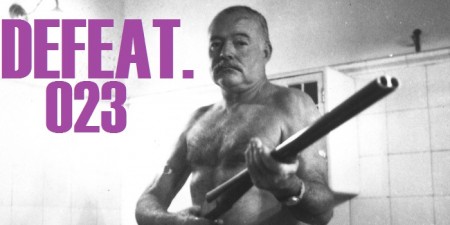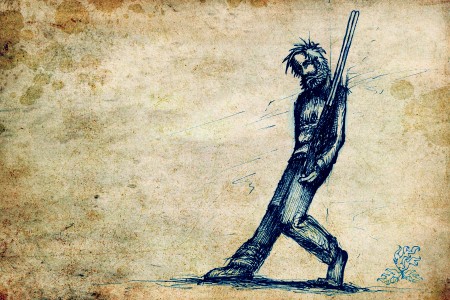DEFEAT. 023 – Death in the Afternoon
[DEFEAT. is Rendar Frankenstein’s truest attempt at fiction. Presented in weekly episodes, the novella tells the tale of Daryl Millar – a hero who dies at the intersection of pop culture, science-fiction, war epic, and fantasy]
Ernest paced back and forth, contemplating whether or not he should go through with it. A Pulitzer and a Nobel Prize in Literature, and yet he had to go to great lengths to get his latest manuscript into the pages of Life Magazine. As he thought about this fact, he coldly nodded his head.
“The world has turned its back on me — just as I knew it would.”
With grave determination, Ernest headed towards his bar, content to mix himself one final daiquiri. But as he reached for his favorite tumbler he immediately stopped, as if sensing an unforgivable misstep. “No, that’d be far too sweet, wouldn’t? Let’s keep this honest, shall we?” The tumbler was then thrown at the wall, connecting with the fully-mounted head of a black bear and shattering in the process.
Instead, the wordsmith snatched an ever-faithful bottle of whiskey. Elevating the bottle’s ass well above his nose, Ernest polished off the remainder of the quart. The wonderful warmth swam into his mouth, his throat, his gut. For the last time, Ernest couldn’t stave off the feeling of satisfaction. So it was with a smile that he put the empty bottle onto the bar top and proceeded to the gun rack.
Ernest stared with an admiration that was the closest he’d ever come to religious reverence. “Such power,” the drunken syllables slipped out. “Pure. Unquestionable. Power.” But as he reached for his weapon of choice, a single white envelope caught his attention and delayed the impending self-infliction. “Ah yes, let me take a peek.”
And for a final, brief moment, Ernest succumbed to the belief that the written word is the single most powerful weapon imaginable.
Picking up the envelope, its contents were remembered, although only vaguely. It had, after all, been over two decades since he’d read the letter — and longer than that since he first wrote it.
Equal parts nostalgia and remorse, the envelope was reopened and its innards extracted.
Ernest closed his eyes and recalled the meeting in which the letter was returned to him. It’d been weeks after her husband’s death and he thought it’d be worthwhile to give her a visit. “Ah yes, the mad widow, as I called her,” Ernest cackled. “Oh, she had it out for me.” He thought of just how much time and effort he had dedicated to visiting the institute and how little gratitude was shown when he arrived.
The writer’s eyes opened and he looked at the letter. It was shaking in his hands, just as it had twenty years before. The eyes were then closed again, and he could hear Zelda’s parting words. “He was done. And you told him he wasn’t. And that is what drove him to the grave, Ernest – the fact that you made him believe that there was more water in a well gone bone-dry.”
Ernest cringed and then began reading. First, his eyes darted to the left-hand corner and he confirmed that this was, in fact, the letter:
To F. SCOTT FITZGERALD, Key West, 28 May 1934
Knowing what he was looking for, he skipped over the opening pleasantries and minutiae. Wanting to get it over with, to get everything over with, he looked to the conclusion:
You see, Bo, you’re not a tragic character. Neither am I. All we are is writers and what we should do is write. Of all people on earth you needed discipline in your work and instead you marry someone who is jealous of your works, wants to compete with you and ruins you. It’s not as simple as that and I thought Zelda was crazy the first time I met her and you complicated it even more by being in love with her and, of course you’re a rummy. But you’re no more of a rummy than Joyce is and most good writers are.
But Scott, good writers always come back. Always. You are twice as good now as you were at the time you think you were so marvelous. You know I never thought so much of Gatsby at the time. You can write twice as well now as you ever could. All you need to do is write truly and not care about what the fate of it is.
Go on and write.
Twenty seven years later, Ernest Hemingway understood that good writers don’t always come back. Fitzgerald peaked with The Great Gatsby. He himself had peaked about seven years prior with The Old Man and the Sea.
“No man deserves such a descent.”
Ernest Hemingway walked to the fireplace and tossed in the letter. He then walked to the gun rack and took down his favorite double-barrel shotgun. He placed the butt-end on the floor and then leaned downwardly, resting his forehead on both barrels.
Blood sprayed all over the room. So did brain and bits of skull.
With this explosion of human matter, the hemorrhaging of a legacy was stopped before it became fatal.
And thus, Ernest Hemingway embarked upon the path of legend.





